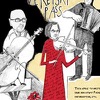





Content © Veretski Pass © Design www.fidlweb.com


Sophia Magid was born into the family of Jewish bibliographer and historian, David Hilelevich and dentist, Hannah Zakharovna Magid. Her family’s wealth and the fact that she was brought up outside the Pale of Settlement allowed Sophia Magid to receive a modern education, beginning with secondary school, and then, from 1912-1917 music studies at the Conservatory of St. Petersburg. Perhaps she did not excel as a student, or was not meant for a concert career, which may have been the reason that she switched her professional focus in 1922 to advanced art studies at the Russian Institute of Art History (in the "MUSO" department). After completing her studies in 1926, Sophia Magid worked in several scientific organizations connected with the study of folklore. In the latter part of the 1920s she was active in the Folklore Section of the Jewish Historical and Ethnographic Society, (see Y. Nemtsov's article, "The New Jewish School in Music" (German, 2004), spearheaded by the composer Zinovy Kiselgoff, who accompanied Sholem Anski on ethnographic expeditions prior to WWI. N. Svetozarova recounts, "My first folklore expedition with Sofia Magid went as far back as 1928. It was a trip to Volhynia to record Jewish folk songs and instrumental music." A new similar expedition took place in 1930, and in 1931 Sofia Magid was invited by the Institute for the Study of Peoples, to visit the Mogilev region to create a collection of recordings of both Belorussian and Jewish folk music.
But Magid did not limit herself to simply recording folk tunes. She was also engaged in the preparation, categorization and transcription of manuscripts for publication. In 1931, she published the volume, "Folk Songs and Instrumental Music of the Jews of Ukraine" which included 300 songs with texts and notes. In 1933 Magid published two articles in the Small Soviet Encyclopedia, one of which was "Jewish Music"). She was given credit for recording revolutionary folklore under the auspices of the Politkotorzhan Society (Leningrad, 1932-1933). Following these recordings she published the results in her 1936 final article, "Jewish revolutionary folklore" in the Journal Sovetskaya etnografiya Nos. 2-3. The preparation of the work "Folk songs of the Jews of Belarus and Volhynia and their social stratification" was also completed the same year.
N. Svetozarova notes that a review was also penned in 1936, titled, "Problems of Folklore" ("Soviet Ethnography", No. 3, 1934). Around the same time that Moyshe Beregovsky began his folk music collecting expeditions around the Ukraine, and Z. Skuditsky began to collect songs of workers and Jewish revolutionaries, Magid was also involved in collecting for the Folklore Section of the Jewish Scientific Institution (Department-Institute-Cabinet) at the Academy of Sciences of Ukraine. In 1932, M. Wiener edited her collection, "Problems of Folklore" in Kiev alongside articles by the editor and his staff.
Magid’s last work was a thesis, which had to be written in off-hours, as she was employed in a strictly non-Jewish institution. In 1938 she completed her study, "The Ballad in Jewish Folklore,” based on her own field recordings, in spite of the fact that there were not many examples of this genre that she was able to find. In this work she analyzes 54 dissertations, and borrowed 3 more from her predecessors. A defense of this thesis was held July 1, 1939 at the Institute of Language and Thought. N.Ya. Marra opposed Magid’s application for her doctorate degree in Art History and Philology.
Magid’s field recordings were published in Germany under the title:
Unser Rebbe, Unser Stalin...: Jiddische Lieder Aus Den St. Petersburger Sammlungen Von Moishe Beregowski (1892-1961) Und Sofia Magid (1892-1954). ... (Judische Musik) (German and Yiddish Edition) (Yiddish) Hardcover – August 1, 2008
Sofya Davidovna Ekmekchi (Magid)
Born: 1892 In: Saint Petersburg, Russia
Died: 1954 (at age 62) In: Saint Petersburg, Russia

Veretski Pass | Band@veretskipass.com
The Magid Chronicles
Veretski Pass
with Joel Rubin